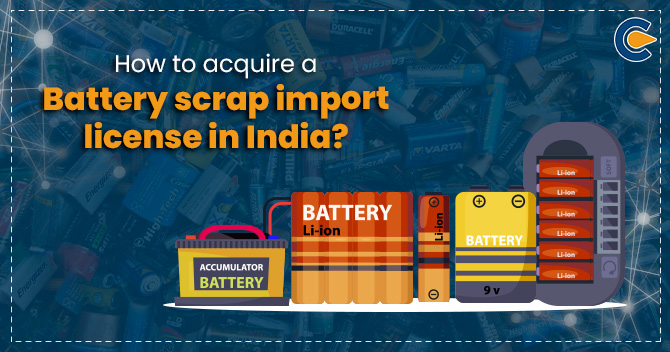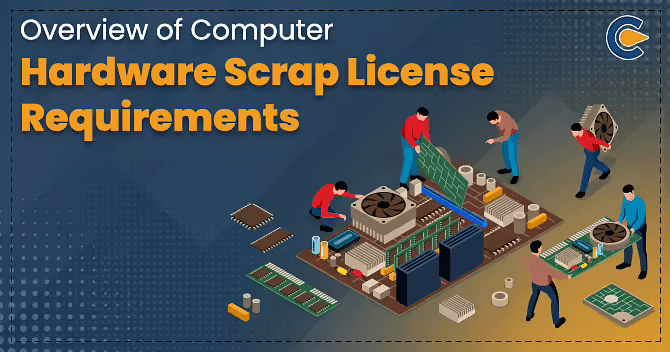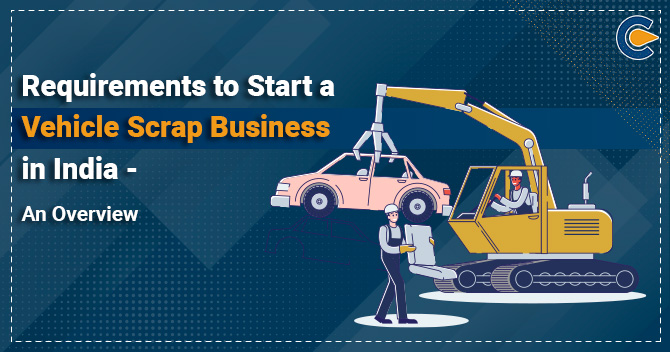With India’s constant rising demand for lead batteries and authorities struggling to meet demand, the import of battery scraps has proven to be a saving grace. But the import of these does come with stipulations and regulations to control the illegal influx of battery scarps in India, for which recyclers need to acquire a Battery Scrap Import License in India.
What Are Battery Scraps?
Battery (Management and Handling) Amendment Rules, 2010 define a battery as a lithium-ion battery/lead battery which acts as a source of electrical energy mainly containing lithium metals and lead. These batteries are believed to have a shelf life of three to five years, after which it is considered as battery scraps which are hazardous in nature and is highly regulated in regard to Cross country movement. Lead battery scarp is available everywhere in the forms of Wet Whole Intact Batteries (RINK), Drained/Dry Whole Intact Lead Batteries (RAINS) and Lead Battery Plates (RAILS).
Many countries export scrap batteries to India. The financial value of scrap battery imports in 2020-21 was 893 million dollars, up from 152.9 million dollars in 2018. Battery imports have increased year after year, especially between 2014 and 2018. India has purchased scrap batteries from the United States, with exports valued at $106.5 million in 2020-21 and Malaysia, with the values close to 72.89 Million USD.
Legislations Governing Battery Scrap Import License in India
The Batteries (Management and handling) Rules, 2001
The Batteries (Management and Handling) Rules, 2001, were enacted to ensure the safe and secure disposal of discarded batteries with lead-acid along with regulating the sale and import of lead-acid batteries. This legislation also provides guidelines for applying for battery scrap import licenses in India and recycling these scraps in a sustainable way. These rules are applicable to anyone who is a Manufacturer, Importer, Re-conditioner, Assembler, Dealer, Recycler, Auctioneer and Bulk Consumer or whoever is involved in the process of manufacturing, exporting, import and use of batteries and their scraps.
According to laid rule 5 of the Batteries (Management and handling) Rules, 2001 Ministry of Environmental and Forest have delegated the power to grant registration to the importers to the Central Pollution Control Board. Hence registration of importers with CPCB is necessary.
Personnel Who Are Required To Register Under Batteries (Management and Handling) Amendment Rules, 2010
- Importers
- Recyclers
- Assemblers
- Manufacturers
- Dealer
Hazardous Waste Management Rules, 2016
Hazardous waste management rules, 2016 was enacted to regulate industries, units, plants or operations which are involved in the generation or consumption of hazardous waste mentioned under the act. The industry involved in such a process under this rule is required to obtain authorization or registration from the competent Authority.
These rules also ensure the secure treatment, import, storage, transportation, collection, handling and disposal of hazardous waste.
Duties of Importers under the Act
- Importers need to ensure that used batteries are collected back as per the regulations, excluding those that are sold back to the original manufacturer or producers. Also, the used batteries that are collected are similar to those new batteries which are sold.
- Importers are required to file half yearly returns of their sale and buyback by 30 June and 30 December to the state board on form 1.
- Importers also have to send the used batteries or battery scarps to the registered recyclers.
- It is also important to ensure that regulated transportation of scrap batteries is done to registered recyclers with no damage to the environment done.
- Create general awareness among the public on the hazards of lead through various forms of media.
Registration for Battery Scrap Import License in India
- The application is to be submitted to the State Pollution Control Board by the recycler who has the license from the state pollution control board for recycling such material and wanting to import scrap batteries.
- After the application is submitted state pollution control board will then move forward along with the recommendations and stipulations for secure transport. This must be reverted within 30 days of receipt of the applications.
- After this, NOC is provided by the state government to the importer if he/she has submitted an authorized consent letter with an authenticated copy from authorities of the state exporting.
- This certification is viable to both recyclers and traders on the basis of which an importer can start battery scrap import.
Further, under the rules, the importer has to adhere to certain guidelines, including maintenance of record of waste imported in Form 3 for making it available to the authorities; along with this, the importer should also file an annual return in Form 4 to state pollution Control Board.
Documents Required For Battery Scrap Import License in India
The document the process is: –
- Commercial Invoice
- Import License
- Bill of landing
- Insurance Certificate
- Industrial License
- Bill of entry
- Purchase order/Letter of credit
- Technical write-up, literature, etc., for specified goods, if any.
Conclusion
The import and recycling of battery scraps in India will result in lesser waste and lesser burden on a landfill and a more sustainable way of completing the constant rise of battery scrubs in India. Still, it is very important that these are regulated by authorities where Battery scrap Import licence in India play a major role as it put the responsibility on the producers to properly manage the hazardous waste.
Read Our Article:What is the Procedure to Avail Battery Import License?











